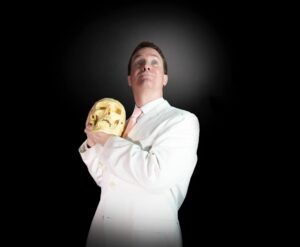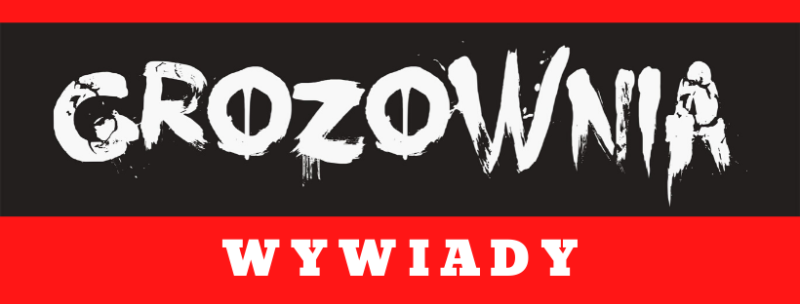tłumaczenie: Michał J. Walczak
Magdalena Paluch: Hello, I am delighted that we can talk on the pages of the Grozownia portal on the occasion of the Polish premiere of your book How to Sell a Haunted House.I’ve just finished reading it, and contrary to what the title might suggest… it’s not a guidebook😉
 Grady Hendrix: I would have made more money if it was a guidebook. 49% of Americans think they’ve lived in a haunted house. That’s a huge market I missed.
Grady Hendrix: I would have made more money if it was a guidebook. 49% of Americans think they’ve lived in a haunted house. That’s a huge market I missed.
MP: How to Sell a Haunted House is the third book by you that I’ve read, and just when I thought my favorite (so far) was HORRORSTÖR, this one made its debut on our publishing market! That’s how I became a fan—both of novels and of Grady Hendrix J Everything I love is here: the sibling relationship, complex family dynamics, the struggle over parental inheritance, dolls from hell, and especially the one that can be associated with either Chucky Doll, Annabelle, or most likely, Punch & Judy dolls. So, I have to ask – what inspired you when crafting the plot of this novel?
GH: I wrote this book during the COVID lockdown and I missed my family. Since I couldn’t spend time with them, I decided to make up an imaginary family and spend time with them instead. And that meant I needed to write a haunted house story because haunted house stories are always about families: family curses, family secrets, ancestral homes.
MP: How to Sell a Haunted House is a book that genuinely scares the reader… Have you ever encountered a haunted house or paranormal phenomena?
GH: I think everyone has, and I’m no different. But in real life, paranormal experiences usually aren’t very interesting: you see someone who shouldn’t be there walk across a room, a door closes, a book moves, you have a dream about your grandmother the night she dies. These have a profound emotional impact on the people who experience them, myself included, but they’re not as dramatic as The Shining.
MP: How do you approach your novels? Do you follow a predetermined plan, or do you let inspiration take over and rely on it completely?
GH: I approach my novels poorly. I start with a plan, write the book, realize the plan stunk, come up with a new plan, write another version of the book, realize that this version stinks too, then I really work on the characters, come up with another plan, write a third draft of the book, and screw that up as well. Usually, it’s the fourth draft of the book that starts turning into the finished novel.
MP: It seems you are an astute observer of reality and pop culture. Your texts draw heavily from both and offer them to us, the readers. Does this make being a writer easier or more challenging?
GH: I mean, that’s the job, as far as I’m concerned. To write books that take place in the world we live in. That means watching less TV and paying more attention to the world around me, and that’s a world where everyone speaks the language of pop culture.
MP: Indeed, being a writer… How did it begin for you? When did you write your first piece of fiction?
GH: I was a journalist for many, many years and then in 2008 when journalism died in America during our big financial crisis and newspapers slashed their budgets and stopped hiring freelancers, I decided I needed a different job, and the only thing that I was capable of doing was typing. Gradually, that turned into a career writing fiction.
MP: Do you have a literary mentor of your own?
GH: My mentor is a place, not a person. In 2009, I went to the Clarion Science Fiction and Fantasy Writer’s Workshop in San Diego. It lasted 6 weeks and each week was taught by a different author, from Holly Black to Liz Hand. That made me get serious about writing, and it introduced me to several people who have had a huge impact on my career.
MP: In Poland, horror literature is still underrated, despite having a number of talented authors. How does it fare in New York?
GH: Horror is hot right now. I mean, horror novels don’t get reviewed very often by the New York Times, or taken seriously by critics or invited to the insider parties, but who cares? Out in the real world, horror and romance are the two genres that are keeping independent bookstores open. Everyone’s reading horror and romance, even though they won’t often admit it.
MP: Do you receive feedback from Polish readers?
GH: I have not, unfortunately!
MP: Six of your books have already been published in our country, the latest by the Zysk and S-ka publishing house. Can we anticipate more?
GH: I hope so. I just need to write faster!
MP: Do you have any rituals that you follow during or after writing?
GH: Only Satanic ones.
MP: My Best Friend’s Exorcist was adapted into a film, and you co-wrote the script. Are you satisfied with the final result?
GH: I actually had nothing to do with that script. They told me they were adapting the book into a movie and three years later I saw the movie along with everyone else. As for the movie itself, I thought the actors did a great job
MP: Speaking of adaptations, is there an ideal adaptation for you, and what is its title?
GH: One day someone will turn Michael McDowell’s Blackwater Saga into a TV series and the world will finally have the epic Southern horror masterpiece on TV that it deserves.
MP: How much of your life or learned lessons do you incorporate into your books?
GH: My books are absolutely based on my life. Every character is based on someone I’ve seen or someone I know, the locations are places I’ve lived or been, and minus a demon or two, they are about things that have happened to me. As far as lessons go, the one thing I try to always keep in mind is that I’m writing for someone who has a stressful life, they’ve had a hard day, and my one job is to take their mind off their problems for a little while.
MP: Will you be able to attend any conventions/festivals in Poland?
GH: I haven’t been invited!
MP: Do you find time to read books? Are they usually horror, or do you explore other genres?
GH: I read everything and it’s mostly for work. This past week, I finished a book about the history of marriage for a future project, re-read HP Lovecraft’s “At the Mountains of Madness” for a short story I’m writing, read several Flannery O’Connor and Eudora Welty short stories for a talk I’m giving on Southern Gothic, and for fun I’m reading an old crime paperback from the ‘70s by George V. Higgins who’s one of the great, under-rated dialogue writers.
MP: Are you currently working on a new novel?
GH: I’m racing against time to finish Witchcraft for Wayward Girls, a witch book set in a home for unwed mothers in 1970. It’s out in August unless I blow my deadline.
MP: What does Grady Hendrix, the author, dream about?
GH: I’ve been dreaming of rats a lot lately. Usually, I dream about a black rat that won’t leave me alone and then I wake up and it’s on my pillow watching me, and then I wake up again.
MP: Thank you very much for the interview, and I hope to see you in Poland!
Grady Hendrix – is an American writer, journalist, columnist and screenwriter known for his 2014 best-selling novel Horrorstör. Hendrix lives in Manhattan and was one of the founders of the Asian Film Festival in New York.
Author’s website: http://www.gradyhendrix.com/
